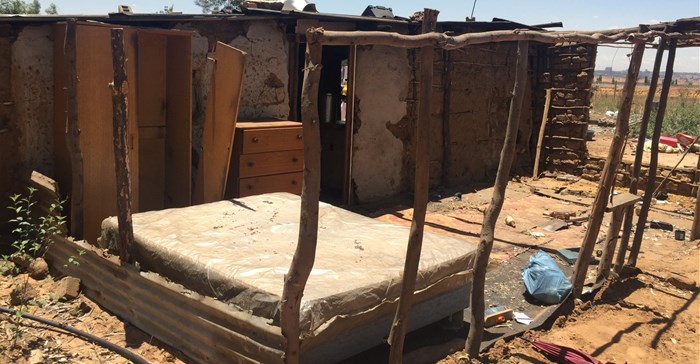In December 2019, the Department of Mineral Resources and Energy (DMRE) published its Draft Mine Community Resettlement Guidelines for comment - part of its process to standardise resettlement practice in mining.

Partially demolished house in the aftermath of resettlement
“It is clear that resettlement is a growing concern during the development of large public and private projects in sectors like mining and energy, It is opportune that government seeks to define a common approach for South Africa – especially when managing involuntary displacement," said Jessica Edwards, senior social scientist at SRK Consulting.
She said that physical and economic displacement of a community is generally an irreversible step with serious implications – both for the project-affected people and for the developers whose projects demand access to land and subsequently resettlement. International guidelines promote avoidance of resettlement during project design wherever possible. However, where resettlement cannot be avoided, careful management is required to ensure positive and sustainable outcomes for all involved.
Creating a manageable framework
Other African countries have been moving in a similar direction to South Africa – to create manageable frameworks in which resettlement can take place. One such country is Guinea, where the rapid expansion of industries such as bauxite mining was leading to more resettlement activity.
“Without suitable legislation or a clearly defined and enforced framework, resettlement in Guinea was happening in an ad hoc fashion – often with unsustainable results for those affected,” said Edwards. “Using our experience of managing resettlement processes in a number of countries, we were able to develop a national framework for Guinea.”
Among the related projects in which SRK has been involved are two resettlement action plans for hydro power schemes in Cameroon and Sierra Leone – as well as for a cement plant in the Democratic Republic of Congo.
“International financial institutions apply their own strict standards to resettlement practices linked to the projects they fund, so it is also vital that projects understand and comply with these requirements,” said SRK Consulting senior social scientist Adel Malebana.
Recommendations
Using its insights into good practice in resettlement, SRK is contributing to the DMRE’s engagement process with a number of specific recommendations. Among its suggestions are that the draft guidelines make a clear distinction between the main types of resettlement agreements: physical, communal and economic displacement.
An agreement signed with individual households relating to their physical displacement, or with business owners relating to their economic displacement, details the compensation provided for losses of shelter, assets and livelihoods. In these cases, it is very important that Project Affected People have individual agreements directly with the company or project proponent.
On the other hand, there are agreements with communities who are indirectly affected by resettlement – who can be said to experience communal displacement. They need to be compensated for the loss of ecosystem services, access and mobility when land use is restricted due to mining. This type of compensation will then be included in a communal agreement.
Loss of heritage
Resettlement projects often lead to the loss not only of housing, agricultural land and other amenities, but also cultural heritage sites and graves. “The draft guidelines are silent on heritage or intangible issues and should consider them,” she said.
There is also an assumption in the draft guidelines that resettlement projects will mainly occur before mining activities commence. However, mining projects often take a phased approach and communities may only need to be resettled at future phases of the project – if and when project expansions are considered viable, for example.
“In our written submission, we also proposed that a standardised valuation matrix – to determine compensation rates for economic displacement – be developed and published on an annual basis,” Edwards said. “This would facilitate a standardised and more transparent compensation process.”



































